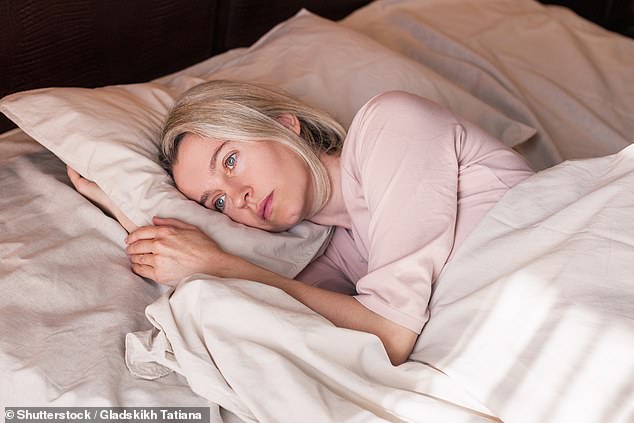Revealed: The exact amount of sleep the average middle-aged woman gets – so are you sleeping more or less than your peers?

Women between the ages of 40 and 60 get an average of just 6 hours and 36 minutes of sleep per night due to frequent insomnia and night sweats, research shows.
A survey of 1,000 women in this age range reveals the harsh reality of menopause, with sleep disorders and joint pain being the two most prominent problems.
Women surveyed reported that they experience sleep problems and insomnia on average ten days a month.
They said they regularly wake up between 3 and 4 a.m., leading to severe exhaustion and fatigue.
A fifth of women say the effects of sleep deprivation and other menopausal symptoms have put a strain on relationships, leading to more arguments with partners or colleagues.

Women aged 40 to 60 get an average of just 6 hours and 36 minutes of sleep per night due to frequent insomnia and night sweats, a study shows (stock image)
The report also shows that women in this age group sleep just 6 hours and 36 minutes per night – less than the NHS recommended 8 hours.
This means that exhausted women in perimenopause and menopause can sleep 17.5 percent less than recommended over 20 years, losing the equivalent of 425 days of sleep over 20 years.
Worst affected are women in their late 50s, who sleep on average just six hours and 12 minutes a night, while one in five regularly sleeps just five hours.
Other common symptoms include feeling emotionally flat, joint pain, brain fog, and irrational thinking.
The survey, commissioned by sleep technology company Simba, also found that women in this stage of life regularly suffer from lower libido, general anxiety and heart palpitations.
Lisa Artis, deputy CEO at Simbas charity partner The Sleep Charity said: ‘Menopause isn’t just about the occasional hot flash, it’s a rollercoaster of physical and mental symptoms.

Worst affected are women in their late 50s, who sleep on average just six hours and 12 minutes a night, while one in five regularly sleeps just five hours (stock image)
‘Although many people consider night sweats to be the key feature of menopause, our research shows that women experience a wide range of symptoms on a daily basis.
‘These are not just minor inconveniences.
‘Women can feel disconnected from their emotions, battle anxiety and deal with extreme fatigue until a third of their middle age.
“And it happens month after month.
‘This is a huge toll on people’s mental and physical health.
‘The hard truth is that women are managing their work, home lives and relationships, while dealing with serious and often invisible symptoms that affect their health and well-being, and require greater recognition, support and effective solutions.’
Select Simba products feature the ‘M-Tick’, a menopause-friendly label designed to help women easily identify products that can support them through symptoms.




